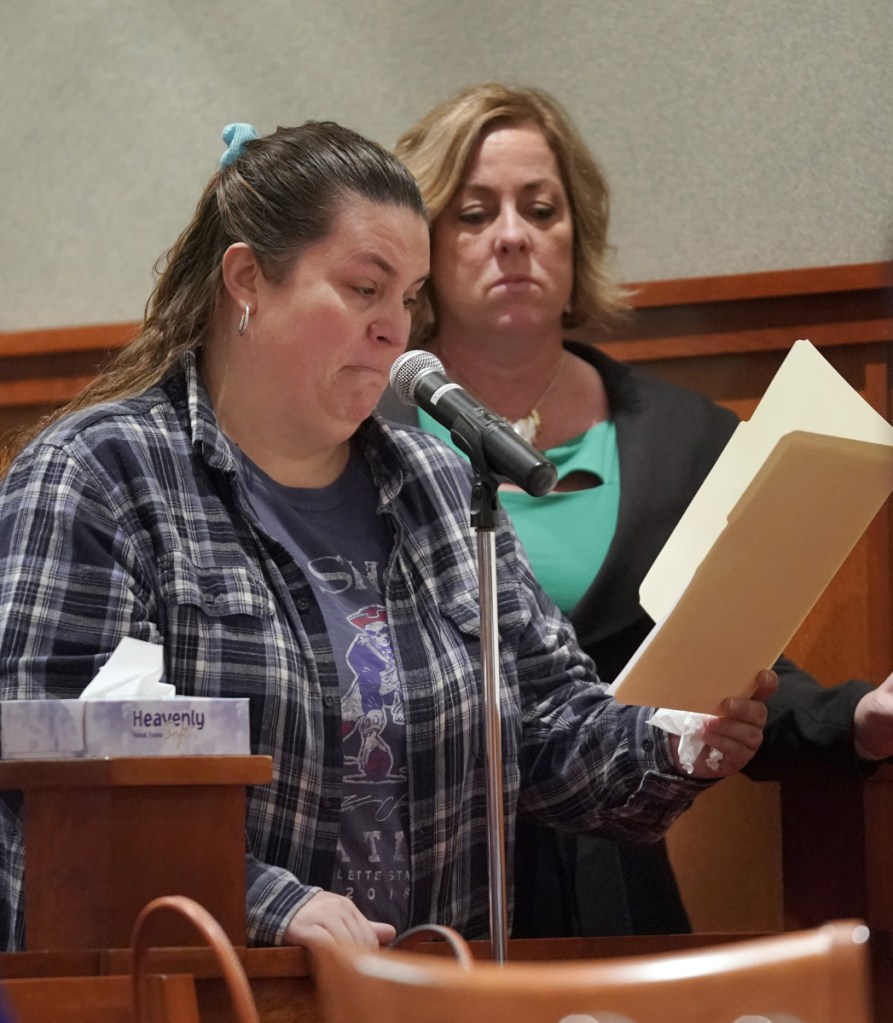PORTLAND — A New York man was sentenced to life in prison Friday for executing an Augusta couple on Christmas morning three years ago.
The state sought two life sentences — to be served concurrently — for the intentional and knowing murders of an Augusta couple, Eric Williams, 35, and Bonnie Royer, 26, early on Dec. 25, 2015.
The judge imposed a 75-year term for Williams’ death and a life sentence for Royer’s death, to be served concurrently.
In a sentencing memo, prosecutors called the case “a poster child for the devastation caused by out-of-state drug dealers coming to Maine and enlisting addicts to do their bidding.”
Marble was convicted by a jury July 18 in Cumberland County Superior Court and, after the jury verdicts, Justice Michaela Murphy convicted Marble of possession of a firearm by a prohibited person.
Twenty people, mostly members of Williams’ and Royer’s families, watched the hearing, and several addressed the judge.
Most of the same family members had been present each day at Marble’s trial and other court hearings in the case, which began in Augusta and was moved to Portland.
“Eric was murdered execution-style; there was no mercy, he was just plain shot,” said Jeff Williams, Eric’s father. “The loss of our son is beyond words.”
He even got a small chuckle from the other family members when he noted that Eric’s nickname, “Chunkie,” came from his being thrown out at second base.
“They said he would have made it if he been a little thinner,” Jeff Williams said. As he spoke, a series of photos from Eric’s life played on a screen in court.
He talked of Eric’s friends holding a candlelight vigil after Eric’s murder, praising Eric’s personality and helpfulness.
“There’s no early parole for us; there’s no good time for us,” Jeff Williams told the judge. “It’s our request that the maximum penalty for this crime for which (Marble) was convicted be imposed, and that’s life without the possibility of parole.”
After Marble’s sentencing, Jeff Williams said, “He got what he deserved. He made the decision to take two and a half lives; it’s too bad he can give only one.” Royer was pregnant when she was killed.
Jeff Williams wore a chain around his neck that held a clear pendant etched with the inscription “In memory of Eric.”
Royer’s grandfather Paul A. Mansir Sr. submitted a statement to the court, saying, “The murder of my granddaughter, Bonnie Royer, has an impact on our whole family. My son lost his only child. His granddaughter, at age 5, lost her mother. Bonnie was also expecting a baby boy we will never see. We will forever be deprived of good times we could have had with Bonnie.” He asked that Marble get the maximum sentence allowed by law.
Royer’s grandmother Wanda Mansir submitted a written statement as well, noting that the family was getting ready for Christmas dinner when they got a call about Bonnie’s death.
“Christmas is a very hard time for me,” she wrote. “It has been over two years, and it still hurts so much.”
“We all suffer with depression on some level because of this,” said Victoria Beloin, who described herself as Royer’s father’s partner, speaking on behalf of Royer’s family. She told Murphy that “after three years of Bonnie’s family enduring this pain,” may Marble be reminded of what he did when he wakes up every day in a prison cell.
Royer was 20 to 22 weeks pregnant when she was shot, a fact witnesses said was known to everyone, including Marble, Deputy Attorney General Lisa Marchese told the judge while listing factors in support of the state’s sentencing recommendation.
“It cannot be forgotten that Bonnie was alive for a period of time,” she said. “She called the 911 operator to say she was shot. She knew she would die and the unborn baby would die.”
A collage of photos of Royer’s life, including one of her visibly pregnant taken a few days before her death, was posted on an easel near the judge’s bench.
“She took it herself and sent it to me, said Christine Collins, Royer’s mother. “She wanted me to see how big her belly was getting.”
Collins said she was “very, very pleased” with the sentence imposed on Marble.
“I think he needs to start rotting now,” she said. “He’ll never see the light of day again.”
Eric Williams’ older brother, Jason Williams, said that as a result of his brother being killed, his mother was unable to return to work despite having been employed for decades, and his father had a heart attack.
“Facing this reality was and continues to be challenging,” said Jason Williams, adding that Christmas has been scarred for his family. After the hearing, he said the family was relieved and happy with the outcome.
Marble’s head and shoulders slumped, and he looked down at the defense table as the victims’ relatives spoke. He appeared to have little reaction to the sentence. A deputy then handcuffed him and walked him out of the courtroom.
In giving the reasons for the sentence, Murphy cited a number of aggravating factors in the case, including the direct impact on the two victims and their families as well as Marble’s criminal record and other criminal activities.
“The damage caused in the central Maine community as a result of Mr. Marble’s criminal enterprises that eventually ensnared both victims, who seemed to both have had problems with addiction, cannot be underestimated,” Murphy said.
With regard to Royer’s death in particular, Murphy said, “the court cannot overlook the fact that she survived the first shot from the Sig Sauer and that she was conscious for — it’s impossible to know — but approximately 10 or 15 minutes it seems from the amount of time she was talking to 911. … She obviously lived briefly and consciously in the hopes that help might arrive to save her and the life of her unborn child. Any woman in her position would have had to be thinking not only of herself but about her pregnancy. Obviously help did not arrive; instead, Mr. Marble came back to the gravel pit and shot her again.”
Murphy talked of the “conscious pain and terror” Royer experienced at that time.
Deputy Attorney General Lisa Marchese, who prosecuted the case along with Assistant Attorney General Meg Elam, said after the hearing, “The sentence today was just, it was appropriate and it really recognized the horrible deaths of these two young people.”
Marble, who did not testify at his trial, has been in custody since Dec. 29, 2015. In court on Friday, his short hair was braided, and he wore his usual dark-framed glasses and was dressed in a bright orange jail uniform. He had a small cross on a chain around his neck. After he sat down at the defense table between his two attorneys, a Cumberland County Sheriff’s Office deputy removed Marble’s handcuffs.
The defense requested “a term of years that enables him to return to society a some point,” attorney Neale Duffett said.
Duffett said Friday that an appeal is planned.
The defense memo says Marble is the youngest of four children, had an abusive father, and later started a “Roc Starz business” with friends that performed at birthday parties and clubs.
“He acknowledges that despite his hardworking nature, he has recently made very poor choices to become deeply involved in drug trafficking in Maine,” Duffett wrote, also noting that Marble has a son and a daughter.
Other than Duffett, no one spoke on Marble’s behalf, and Marble did not address the judge at the sentencing hearing. His mother, who had attended the trial, did not attend the sentencing.
Authorities said Williams bought drugs from Marble and also assisted him in dealing drugs.
The killings occurred after the drug-related relationship soured and Marble suspected — rightly, as it turned out — that Williams and others had burglarized the apartment Marble was staying in while he was on a drug run to southern Maine.
Television sets, drugs, a gun and several backpacks were stolen during the burglary, and some were recovered at Williams’ home.
On Oct. 5, Marble’s attorneys argued that he should get a new trial, saying a faulty search warrant was used to gain Marble’s cellphone site location data. Jurors were told that the cellphone had been tracked from Marble’s apartment in Augusta to the site of the killings in a rural section of Manchester, and then back to his residence.
Murphy ruled that while the search warrant application contained “ambiguous language,” there was ample probable cause to get the phone location. She also concluded that the jury was instructed properly on accomplice liability because the defense had suggested someone other than Marble had committed the crime.
Defense attorneys maintained that the nonprofessional witnesses who testified at the trial — all of whom received immunity from prosecution for their actions — were unreliable. In particular, they cited testimony by Timothy Bragg, who said he had bought two firearms for Marble, had driven Marble back from the area where the bodies were found, and had watched Marble throw away the gun used in the shootings near the railroad trestle in Augusta.
Officials said there was a big demand for drugs Christmas Eve, prompting Marble to make a drug run; and he heard later that while he was gone, Williams had burglarized the Augusta apartment where Marble was staying.
So Marble arranged for Williams, who was with his girlfriend, Royer, to pick him up shortly after 3 a.m. Christmas Day and drive to the entrance of a gravel pit. Marble, who was in the back seat of Williams’ Chevrolet Trailblazer, shot both once in the head, and then shot Royer a second time. Authorities said Marble killed them as retribution for the burglary.
Marchese cited records showing that Marble’s cellphone — which he insisted to police could be used only by him — had been traced all along the route from Augusta to the gravel pit off Sanford Road in the Summerhaven area of Manchester, where the killings took place.
At Friday’s sentencing hearing, Marchese said Marble “decided to show the other addicts what would happen if they crossed David Marble.”
Bragg testified — under a grant of immunity from the state — that he was at the scene and heard all three shots before driving Marble from the scene not once, but twice because Marble told him to turn around and return to the pit to collect his cellphone.
Marble’s case took on additional statewide prominence when he was among those referenced by Gov. Paul LePage in early 2016, with the governor saying drug dealers were coming to Maine with names such as “D-Money, Smoothie and Shifty” and “half the time they impregnate a young white girl before they leave.” D-Money, or Dee Money, is an alias of Marble’s, but the references to the alias were ordered removed from most court documents because his lawyers were concerned it could be inflammatory, given LePage’s use of the nickname.
Marble’s nickname on his Facebook page is “Dee Money.” A post apparently by Marble, which was put on Facebook shortly after the 2015 slayings, says, “This was a good Christmas after all everybody got to present this year and I was not in locked up.” Another of his posts says, “Forgive me GOD FOR I HAVE SIN. Spiritus Sancti.”
Betty Adams — 621-5631
Twitter: @betadams
Comments are not available on this story.
Send questions/comments to the editors.







